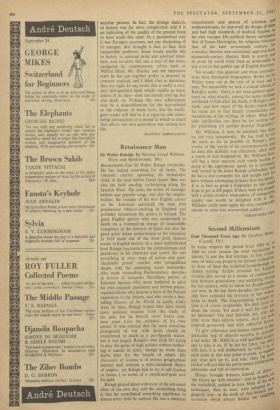Renaissance Man
Sir Walter Raleigh. By Norman Lloyd Williams. (Eyre and Spottiswoode, 30s.) BIOGRAPHERS find Sir Walter Ralegh irresistible. He has indeed something for all tastes. The romantic courtier spreading his technicolor cloak in the mud before Good Queen Bess was also the bold sea-dog, yo-ho-hoing along the Spanish Main. The poet, the writer of nostalgic ballads and popular songs, was also the empire- builder, the founder of the first English colony on the American mainland, the man who popularised tobacco-smoking in England and probably introduced the potato to Ireland. The great English patriot who was condemned to death on a trumped-up charge of treasonable conspiracy in the interests of Spain was also the great actor whose performance at his execution in 1618 made one of the most justly famous scenes in English history. At a more sophisticated level Ralegh fascinates by the contradictions and paradoxes in his character and career. He was everything at once—man of action and poet; `damnably proud' courtier who sympathised deeply with the underdog; hated monopolist who made resounding Parliamentary speeches in favour of economic liberalism; patron of Edmund Spenser who never bothered to print his own uniquely passionate and intense poems; reputed atheist who became a hero of the Puritan
opposition to the Stuarts, and who wrote a best- selling History of the World to justify God's
ways to man. Ralegh hoped that men would learn political wisdom from the study of the past, but he himself never learnt com- mon sense from the mistakes of his own career. It was ironical that the most notorious protagonist of war with Spain should be condemned to death as a pro-Spanish traitor, but it was largely Ralegh's own fault for trying to play the game of high politics without bother- ing to master its rules: though he wrote them
down later for the benefit of others. His Discovery of Guiana is of serious geographical interest, and contains a well-considered theory of empire: yet Ralegh had to try to sell Guiana to James I in terms of a smash-and-grab raid for gold.
Ralegh played about with most of the advanced ideas of his own day, and the astonishing thing is that he contributed something significant in almost every field he entered. He was a chemical
experimenter and patron of scientists and mathematicians; he improved the design of ships and had high standards of medical hygiene oa his own voyages. His political theory anticipated that of James Harrington, his religious tolerance that of the later seventeenth century, his economic theories won astonished approval iron') nineteenth-century liberals. Both in poetry and in prose he could write lines as memorable as any even in that golden age of English literature.
No wonder this glamour and these contradic- tions have fascinated biographers. Books on Sir Walter come out at the rate of at least one 3 year. Yet meanwhile we lack a critical edition of Ralegh's works. There is not even general agree- ment on what exactly, among the many writings attributed to him after his death, is Ralegh's own work; and how many of the books which bear his name are in fact largely compilations and translations of the writings of others What pos- sible justification can there be for writing andfor publishing yet another popular biography?
Mr. Williams, it must be admitted, has done his job very competently. He has tried W tell the story as far as possible in Ralegh's OW; words, or the words of his contemporaries, and he does this skilfully and effectively, often With a touch of true imagination. Mr. Williams him' self has a terse staccato style which hustles us along at the appropriate speed; he is extremelYd welt versed in the latest Ralegh scholarship; an he has a real sympathy for and insight into his hero without attempting to make him too hernt,cd It is in fact as good a biography as one con; hope to get in 260 pages. If there were
not already
half a dozen modern biographies of comparable quality one would be delighted with ir- Williams really must apply his very considerable talents to some less overworked subject.
): CHRISTOPHER 111(j'










































 Previous page
Previous page